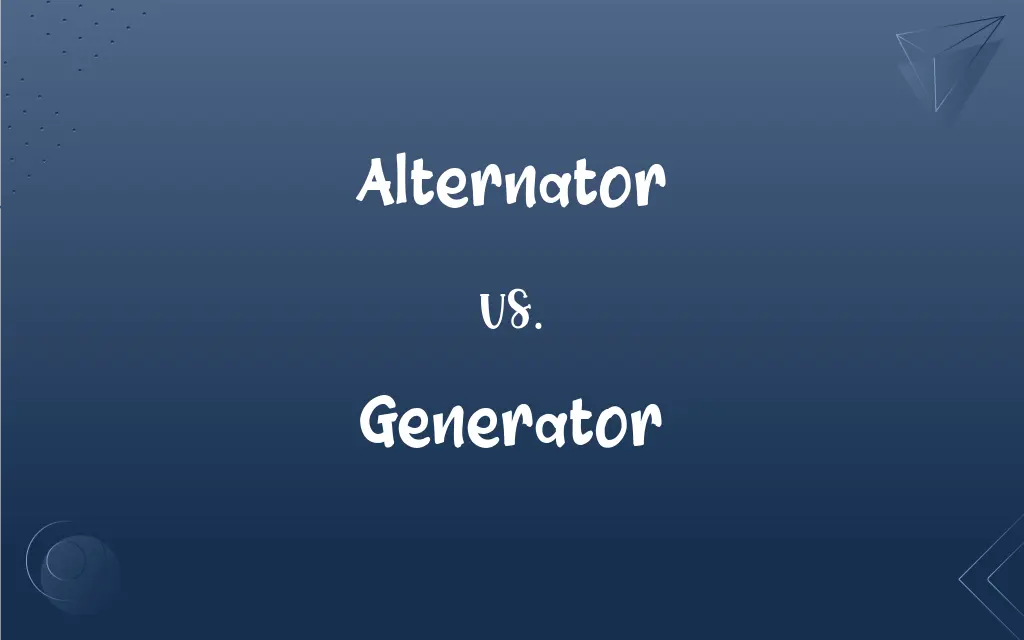Alternator vs. Generator: What's the Difference?
Edited by Aimie Carlson || By Harlon Moss || Updated on October 3, 2023
An alternator converts mechanical energy to alternating current (AC), while a generator can produce either AC or direct current (DC).

Key Differences
An alternator is a specific type of machine designed to produce alternating current (AC). On the other hand, a generator is a broad term that refers to a machine which converts mechanical energy into electrical energy, either as AC or DC.
In vehicles, the alternator is responsible for powering the electrical system and charging the battery when the engine is running. The generator, in its early automotive use, performed a similar function but was eventually replaced by alternators due to their efficiency and the ability to produce consistent voltage at varying engine speeds.
The output of an alternator is always AC which can be converted to DC if needed, using rectifiers. In contrast, generators can be designed to produce either AC or DC directly.
Alternators are often more efficient in terms of size and weight for the same power output compared to generators. This makes them particularly favorable for automotive applications.
Both alternators and generators play crucial roles in various applications. However, the choice between them is usually determined by the specific requirement of the electrical load and the application.
ADVERTISEMENT
Comparison Chart
Type of Current
Always produces AC.
Can produce either AC or DC.
Use in Vehicles
Powers electrical system & charges the battery
Earlier used for similar purposes.
Efficiency
Generally more efficient for same power output
Might be bulkier for the same power output.
Application Variety
Common in automotive and industrial sectors.
Used in power plants, homes, industries etc.
Design Complexity
Contains fewer windings and is self-exciting.
Can be more complex depending on type.
ADVERTISEMENT
Alternator and Generator Definitions
Alternator
An alternator produces electricity using a rotating magnetic field.
Technicians test the alternator to ensure it produces the right amount of current.
Generator
A generator is a device that transforms mechanical energy into electrical energy.
We used a generator during the blackout to power our home.
Alternator
An alternator is a machine that converts mechanical energy into alternating current (AC).
The car's alternator keeps the battery charged.
Generator
A generator is widely used in power plants to produce electricity.
The hydroelectric dam uses water to spin a large generator.
Alternator
The alternator operates based on the principle of electromagnetic induction.
The mechanic explained how the alternator works to the curious student.
Generator
Generators come in various sizes, from portable units to industrial giants.
After the storm, many households bought portable generators.
Alternator
An alternator is typically used in modern vehicles to power the electrical system.
When the alternator fails, the battery will soon drain.
Generator
The generator works based on the principle of electromagnetic induction.
The physics class built a small generator as a project.
Alternator
Alternators are essential for maintaining battery health in vehicles.
If the alternator is faulty, the car might not start.
Generator
Generators can be designed to produce alternating current (AC) or direct current (DC).
The campsite had a small generator to provide AC for the lights.
Alternator
An electric generator that produces alternating current.
Generator
One that generates, especially a machine that converts mechanical energy into electrical energy.
Alternator
(electrical engineering) An electric generator which produces alternating current through mechanical means.
Generator
An apparatus that generates vapor or gas.
Alternator
An electric generator or dynamo for producing alternating currents.
Generator
A circuit that generates a specified waveform.
Alternator
An old term for an electric generator that produces alternating current (especially in automobiles)
Generator
(Mathematics) See generatrix.
FAQs
Can generators be used for homes?
Yes, generators can be used to provide backup power to homes during outages.
What does a generator do?
A generator transforms mechanical energy into electrical energy, either as AC or DC.
Are alternators used in cars?
Yes, alternators are used in modern vehicles to power the electrical system and charge the battery.
What is an alternator?
An alternator is a machine that converts mechanical energy into alternating current (AC).
Does an alternator produce AC or DC?
An alternator produces AC, which can be converted to DC using rectifiers.
Can a bad alternator drain a car battery?
Yes, a malfunctioning alternator can fail to charge the battery, leading it to drain.
Why did cars switch from generators to alternators?
Alternators are more efficient, provide consistent voltage at varying engine speeds, and are generally more reliable than early automotive generators.
Are there different types of alternators?
Yes, there are various designs of alternators based on applications and requirements.
Can you use a generator continuously?
While some industrial generators can run continuously, many portable generators are designed for intermittent use and need breaks.
Can a generator produce both AC and DC?
Yes, generators can be designed to produce either AC or DC.
Can you run a house on a generator?
Yes, with the right size and setup, a generator can power a house.
How do you know if a generator is working correctly?
Regular maintenance checks, listening for unusual noises, and monitoring output voltage can help determine a generator's health.
What powers an alternator?
In vehicles, the engine powers the alternator using a belt system.
What fuels a generator?
Generators can run on various fuels, including gasoline, diesel, propane,
How long do generators last?
The lifespan of a generator varies based on usage, maintenance, and type, but many can last 20-30 years or more with proper care.
How often should an alternator be replaced?
Alternators typically last 7-10 years, but lifespan varies based on usage and maintenance.
How does a generator start?
Generators can be started manually with a pull cord or automatically with an electric starter.
Is the alternator responsible for charging the car battery?
Yes, the alternator charges the car battery while the engine is running.
Do alternators and generators work on the same principle?
Both work on the principle of electromagnetic induction but are designed for different outputs and applications.
Can generators be harmful?
If used improperly, generators can pose risks, including carbon monoxide poisoning, electrocution, and fire hazards.
About Author
Written by
Harlon MossHarlon is a seasoned quality moderator and accomplished content writer for Difference Wiki. An alumnus of the prestigious University of California, he earned his degree in Computer Science. Leveraging his academic background, Harlon brings a meticulous and informed perspective to his work, ensuring content accuracy and excellence.
Edited by
Aimie CarlsonAimie Carlson, holding a master's degree in English literature, is a fervent English language enthusiast. She lends her writing talents to Difference Wiki, a prominent website that specializes in comparisons, offering readers insightful analyses that both captivate and inform.































































